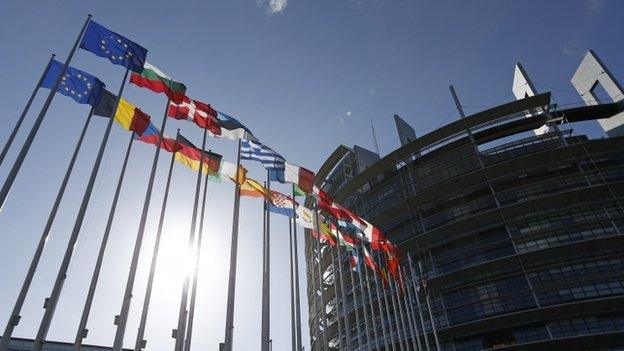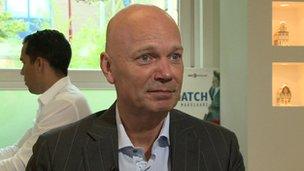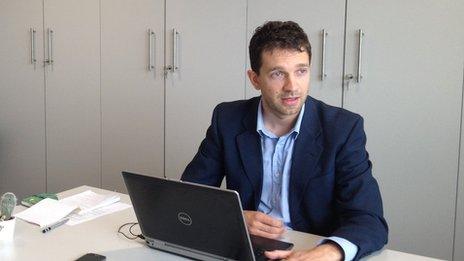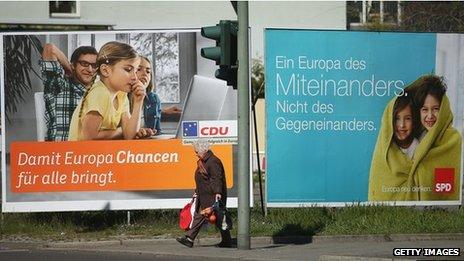What has the European Parliament done for business?
- Published

The business world has changed enormously since the inception of the European Parliament
It may be 400 million private citizens who have the right to choose the 751 members of the European Parliament, but it's 20 million firms across the EU that are the essential wealth and job creators.
The decisions of the Strasbourg and Brussels Parliaments matter to business - all the more so now with MEPs "co-deciding" up to 70% of EU-wide laws.
What is unarguable is that the business world looks very different from that of 1979, when the Parliament ceased to be a mere consultative body and became directly elected by citizens. Since then, 18 out of 28 EU countries have adopted the euro, there is passport-free travel across most of the continent, and we take the principles of data protection for granted.
Ask MEPs to point to their achievements on the financial front, and they would doubtless start by brandishing a list of the decisions taken at their most recent plenary session, external:
They approved plans for protecting deposits and winding down troubled banks without recourse to taxpayers
They backed a mandatory "made in" label showing the origin of non-food products, and voted to reduce the use of light throwaway plastic bags
Every EU resident will have an entitlement to a bank account, and the right to keep their existing pension rights if they move to another EU state
More controversially, rules were adopted to limit high-frequency trading based on complex computer algorithms. These are cited by some as a cause of stock market volatility.
Business v consumer interests
And nobody should doubt the potency of some of the Parliament's decisions.
Take, for example, the recent vote to restrict internet service providers' ability to charge data-hungry services for faster network access. MEPs upheld the key principle of "net neutrality" - the idea that all internet traffic should be treated equally and not blocked or given preferential treatment by service providers.

The law is designed to ensure internet providers treat all data equally
But with popular movie sites like Netflix gobbling up large amounts of precious bandwidth, there is little scope to charge such sites for such heavy use and to ensure their films actually play smoothly on subscribers' screens.
Clearly, the Parliament has many conflicting business and consumer interests to weigh in its decisions. Yet in this case, trade bodies think the vote was rushed after too little technical analysis.
What is certain is that the long tail of the sovereign credit and banking crisis will continue to cast a shadow when the next batch of representatives take their seats.
The latest figures show that few eurozone businesses outside Germany have seen much recovery - with stagnation in France, a renewed GDP dip in Italy, and sharp relapses in the Netherlands and Portugal.

Estate agent Dennis Stello wants policymakers to target low interest rates and inflation
Yet MEPs have never used their powers to block eurozone austerity measures. The collapse of the euro is seen as the worst possible evil. Much to the chagrin of some voters, MEPs are elected to represent pan-European interests, rather than national concerns.
'Whatever it takes'
So what do small businesses want from the policymakers?
Take Dennis Stello, principal of Match Makelaars, an estate agency in Rotterdam. The Dutch port city remains at the sharp end of a damaging property crisis - a prime cause of the economic stagnation.
The housing dam broke five years ago, and only now are overstretched borrowers and their lenders starting to recover from the impact of price falls of up to 30%.
Mr Stello says local banks have lost confidence and are reluctant to invest in property in their own country.
So his message to MEPs is simple: "In other countries property prices are going up, but not here. Europe's policymakers need to do whatever it takes to keep interest rates low and inflation down or the market will collapse immediately."
'Sending a signal'
Riccardo Dondi is the marketing chief of Hivejobs, an Italian online start-up that helps match employers with the most suitable job candidates.

Mr Dondi says the "digital agenda" is starting to make a difference in Italy
"Three years ago, only a few were talking about start-ups and help to new companies," he says.
"Now, for example, the EU Youth Guarantee, external scheme aims to help people under 25 to receive job offers or education without interruptions.
"It's sending a signal that individual countries should invest in unemployment services to make them more attractive to young people. For example, in Italy many don't find any reason or benefit to go to an unemployment office."
MEPs know that much graft lies ahead in helping to build economic confidence so wealth creation can follow. A study of small and medium-sized enterprises, external carried out by the professional services firm Mazars suggests that when it comes to the business economy, we now have a three-speed Europe.
Out of eight countries studied, only German and Swedish firms were seen to have fully recovered from the global recession. French and Dutch companies were further behind, with small businesses in Ireland, Spain, Portugal and even the UK still falling into the "weak" category.

Hundreds of millions of voters across Europe will go to the polls this week
Big unknown
The wild card in the forthcoming election remains the size of the euro sceptic vote. David Campbell Bannerman, a Conservative MEP for the East of England, recently told a Washington institution that the EU and its single market were important, but its share of world wealth was plummeting.
"Over-regulation and red tape in terms of excessive employment laws, health and safety and environment policy are destroying Europe's competitiveness and exporting jobs and wealth to emerging economies," he told his audience.
But Catherine Bearder, Liberal Democrat MEP for Hampshire, counters that any disruption in business relations within Europe should be avoided.
On a visit to Bainbridge International, a marine business in the south of England, she said: "The marine industry [in the UK] is a significant exporter, with one half of all its exports going to the EU and the rest of Europe. It's vital we don't threaten this industry and those it employs by pulling up the drawbridge to our closest trading partners."
The big unknown is what impact an influx of populist MEPs would have when it comes to a vote on financial issues. Some commentators have suggested new alliances between squeezed centrist parties could neutralise the voting power of the new arrivals.
But a desire among euro sceptic MEPs to protect existing jobs and the status quo in their member states could come out in opposition to extending the single market, deepening European Monetary Union or supporting freer trade. It is also likely a larger number of MEPs may demand reform to the rules on the free movement of people.
With new MEPs of every political and economic hue anxious to make their mark in Brussels and Strasbourg, it could be a bumpy ride for business.